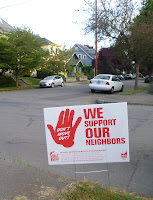 |
| Don't move out! We support our neighbors. |
I spent the last few days with the Rural Organizing Project (ROP). It has democracy and civic participation, immigration fairness, lesbian, gay, bisexual, transgender and queer (LGBTQ) justice, economic justice and the cost of war on its agenda. ROP is not primarily campaign-driven but focuses instead on building the infrastructure of the organization through engaging people in different ways. Its organizing model builds on neighborhood networks, and its primary target is to build trust among community members and make them more and more politicized.
One of its main tools is peer-learning about issues which are crucial to the community. In order to do this, for example, community members hold regular get-togethers in their homes to discuss social issues (living room conversations, kitchen table activism). The invitation to the event comes from a neighbor instead of the organization, and it is just icing on the cake when, in the end, participants get involved in at least a low-stake action (calling a legislator, signing a petition, etc.). Mobilization is not the ultimate goal of a living room conversation, but it is definitely done to help people problem solve a tough topic of the moment and talk about it in a political context. The role of ROP is to build the capacity of - and strengthen - these communities. These autonomous community groups work with the issues of the organization and may also get involved in ROP campaigns or in the activities of ROP allies. The primary focus of the organization, however, is trust and relationship-building in the community and at the same time, their politicization.
A lot of thoughts came into my mind when I was pondering this model. First of all, the heart of my organization model is campaigning. Real change usually requires a series of consistent, creative actions which challenges the decision-maker and makes it straightforward that people, even with different social statuses, are ready to move together and implement all available democratic tools to achieve their goals. Based on my experience, people learn most and get politicized more easily by participating in an action: when preparation takes into account how to frame the issue, how people have a specific role, and what is at stake.
And then I was thinking how many times I heard how important personal relationships are in organizing. Trust is also essential for a consistent campaign, because without a strong and inspiring community, people will be reluctant to step out of their comfort zones, that is, use tactics which they were reluctant to use earlier. Or in other words, their understanding and anger reach a level which makes them ready to increase the stakes. To be able to fundamentally challenge decision-makers (to escalate a campaign), this is a must.
For a campaign-driven organization, however, it is often challenging to focus on base-building. Base-building requires a totally different type of work and attention, where the emphasis is on agitating and building relationships with more and more people. The model of ROP, which focuses on base-building through political education and low-stake actions instead of campaigning, links up a supporter and activist base with organizations working with the same issues. Maybe members of the neighborhood in the picture above, where the community promises support to those whose homes have been foreclosed, entered the public arena after they had been for long talking about social issues more honestly and in a more organized manner.
Thanks for the conversations for Marcy Westerling, Amanda Aguilar Shank, Sarah Loose and Cara Shufelt.
Read it in Hungarian.
No comments:
Post a Comment